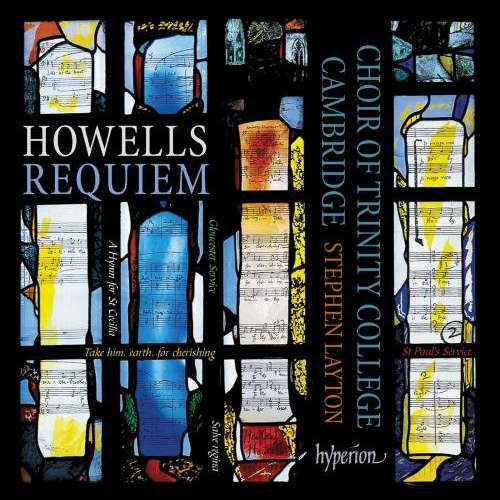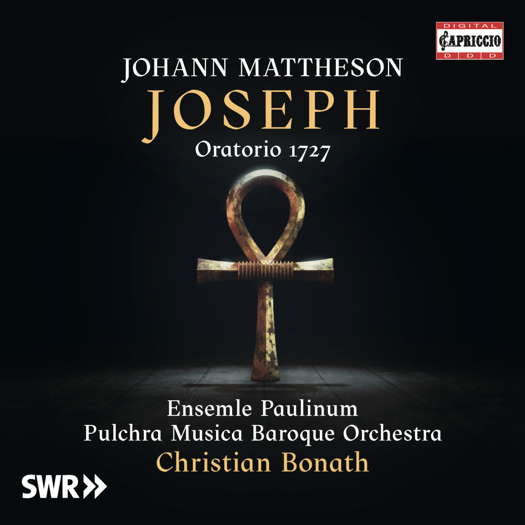 SPONSORED: CD Spotlight. Beautifully Apt - Choral music by Herbert Howells, heard by Robert Anderson.
SPONSORED: CD Spotlight. Beautifully Apt - Choral music by Herbert Howells, heard by Robert Anderson.
All sponsored features >>
- Roger Quilter
- Conlon Nancarrow
- Heart of England Orchestra
- symphonic winds
- Belgium
- Leamington Spa
- Stéphane Rancourt
- Gordon Jacob: Wind Quintet No 1
 DISCUSSION: John Dante Prevedini leads a discussion about Music and the Visual World, including contributions from Celia Craig, Halida Dinova and Yekaterina Lebedeva.
DISCUSSION: John Dante Prevedini leads a discussion about Music and the Visual World, including contributions from Celia Craig, Halida Dinova and Yekaterina Lebedeva.

Truly Gripping, Attractive and Alluring
Johann Mattheson's oratorio 'Joseph', highly commended by RODERIC DUNNETT
'... an outstanding performance in every way, and indeed a perfect introduction to Mattheson's fresh and vital writing ...'
Amid the vast, phenomenally gifted retinue of German Baroque composers, Johann Mattheson doesn't immediately spring to mind. Indeed he languishes, far from being well known. Even in Hamburg, Germany's second largest city, where he acquired the coveted role of organist at St Mary's Cathedral in 1715, other composers like Reinhard Keiser, Christoph Graupner, Telemann and, of course, Handel (with whom he enjoyed a briefly interrupted but close friendship), were active, and their output nowadays is far better known; not least for their contributions to the opera stage.
Yet the fluent English-speaking Mattheson (1681-1764), who survived into his eighties and despite an onset of deafness enjoyed a long and productive life, was a figure of meaningful significance. His position gave him a leading role in Hamburg's music. His stature was very considerable. As a composer, he produced above all some twenty-four oratorios, usually for special occasions.
A clutch of operas - half of which are lost, but others rewardingly rediscovered, in Eastern Europe in the late 1990s - confirmed his aptitude for dramatic writing, and indeed this shows vividly in the present oratorio, Joseph, not least because he wrote the solo roles for singers he knew from the opera.
Indeed it's not surprising that keyboard works - many of them outstanding, respected and admired at the time - figure notably in his substantial output. He was known especially, perhaps unfortunately, as a leading, scholarly musical theorist, writing extensively on musical theory and technique, which nowadays - if noticed at all - has perhaps tended to overshadow his prowess, so blatant and manifest here, as a composer.
Joseph was written, or at least first performed, in 1727. It is a work of impressive and remarkable imagination and mastery. If there are reservations, and there are not many if at all, one might point out that the soprano, Cornelia Fahrion, could have been allotted a larger and more fulfilling role. In addition, recitative plays a more substantial role than aria, which means there are quite a lot of shortish movements. This might have been a drawback; but it is not. The reason is that time and again, these compact (yet gripping) recitatives have a dramatic impact of their own, verging on what might be called arioso: in other words, heading towards aria. It does not diminish one bit from the graphic tension of the story from Genesis, the growing conflict between Joseph, or at least the Israelites, and Pharaoh.
This is an outstanding performance in every way, and indeed a perfect introduction to Mattheson's fresh and vital writing, thanks to the exciting approach of conductor Christian Bonath and the vivacity and perfection in every way of his band, the Ensemble Paulinum. Bonath, to his credit, has a reputation for bringing to the fore lesser known figures well familiar in their time - Fux, Heinichen, or the prolific but now almost totally unknown (Johann) Valentin Rathgeber (1682-1750), an almost exact contemporary of J S Bach.
This highly desirable disc gains its, at best, stunning impression from the incisive and exquisite playing of Bonath's string ensemble (which he founded in 2009 in Worms, some way south of Frankfurt): not least in the buoyant, appealing Sinfonia which launches the work, and in the several instrumental links Mattheson uses, nearly always to advantage, to introduce individual movements.
Listen — Johann Mattheson: Sinfonia (Joseph)
(C5448 track 1, 0:00-0:31) ℗ 2017 SWR / 2022 Capriccio :
Bonath has also amassed a superb team of five soloists. Some of the most thrilling, and at times awesome, singing comes (especially) late in Part Two from his bass, Johannes Hill, to whom Mattheson has allocated some wonderfully dramatic (and vividly sung) movements, both energised recitative and vital aria.
This applies, not least, towards the close, in 'Ein bruder lebt Brüderlich' and 'Ihr unbarmherzigen Tyrannen ('you pitiless Tyrant ...') - no doubting who's the merciless figure here.
Listen — Johann Mattheson: Ihr unbarmherzigen Tyrannen (Joseph)
(C5448 track 17, 0:00-0:52) ℗ 2017 SWR / 2022 Capriccio :
Each of these bass sections is really worth relishing; as indeed is 'Wehr mich nicht' - 'Fight (or conversely, defend) me not', which Mattheson enhances with a seeming hint of duetting, perhaps with a bass-sounding low tenor.
Listen — Johann Mattheson: Wehr mich nicht (Joseph)
(C5448 track 10, 0:00-0:48) ℗ 2017 SWR / 2022 Capriccio :
The lead tenor here - Klemens Mölkner - is pure joy to listen to as well: he's as light and delicate, indeed touching, as Hill is periodically fierce and vengeful. He's enchanting in early recitatives, and especially gorgeous in his grieving aria Betrübtes Herz ('O saddened, troubled heart'), whose plaintive falling pattern could almost be from Bach's St John Passion. Bonath's singers here appear all quite young, and that youthfulness shines through every movement.
Listen — Johann Mattheson: Betrübtes Herz (Joseph)
(C5448 track 6, 0:00-0:55) ℗ 2017 SWR / 2022 Capriccio :
One could go further. 'Wie gross die Bosheit ist' ('How great is the wickedness') is, perhaps surprisingly, but deeply affectingly, a lovely, brief but telling short aria for soprano; and although there is virtually no chorus in the work - a brief, yearning ensemble in the second section, 'Ich will an andern üben', might just qualify - it is she (Fahrion) who leads off a wonderful imitative section, 'Des Neiders Auge' ('The eye of envy'), in which all the solo voices gradually fold in, bringing with them a deeply affecting passage of counterpoint.
Listen — Johann Mattheson: Des Neiders Auge (Joseph)
(C5448 track 7, 0:00-0:53) ℗ 2017 SWR / 2022 Capriccio :
It is impossible not to be bowled over by this enchanting, beautifully shaped creation, especially with the sensitive and insightful conducting of Christian Bonath, who seems to have the gift of seeking out every subtle detail and facet of this excellent rare work, and indeed with such singing and playing makes a case for Mattheson that is truly gripping, attractive and alluring.
Listen — Johann Mattheson: Grausamkeit, fort, fort, fort! (Joseph)
(C5448 track 22, 3:59-4:51) ℗ 2017 SWR / 2022 Capriccio :
We are treated to the most scintillating experience from one who is revealed most clearly to be a composer of the highest ability - as indeed his contemporaries recognised. One has no hesitation in commending this richly rewarding Capriccio disc most highly.
Copyright © 4 May 2022
Roderic Dunnett,
Coventry UK

CD INFORMATION - JOHANN MATTHESON: JOSEPH


